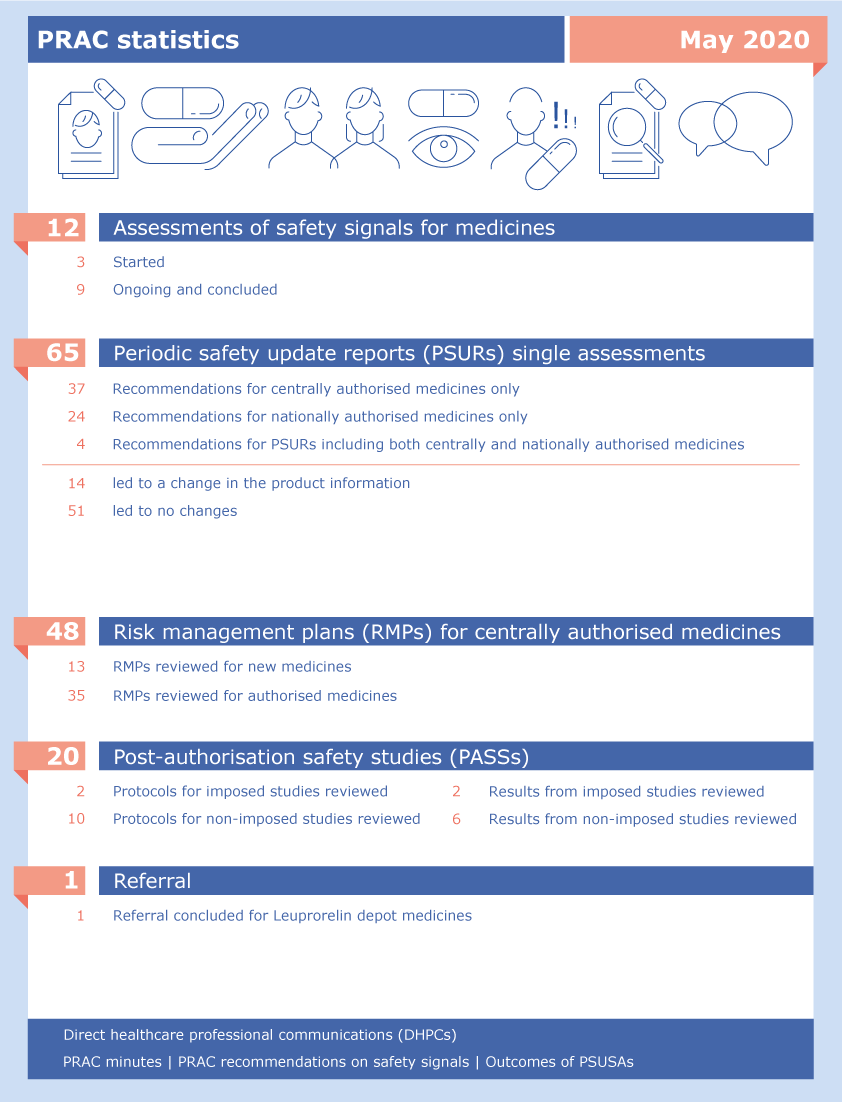Meeting highlights from the Pharmacovigilance Risk Assessment Committee (PRAC) 11-14 May 2020
NewsHumanPharmacovigilanceReferrals
EMA’s safety committee (PRAC) recommends updating the current safety information for hormone replacement therapy (HRT) used to treat symptoms of the menopause.
The updates are based on evidence from a large study published in The Lancet[1] in August 2019, which confirmed the known higher risk of breast cancer in women using HRT. Furthermore, the results showed that the risk may continue to be increased for ten years or more after stopping HRT, if it has been used for more than five years.
Having assessed all available evidence, the PRAC recommends changes in the product information for implementation by authorities to reflect the following updates:
The PRAC stresses that, as already indicated in the product information of HRT medicines, women should only take hormone replacement therapy for the treatment of symptoms of menopause at the lowest dose and for the shortest possible time that works for them. Women should also have regular check-ups, including breast screening, in line with current recommendations, and seek medical attention if they notice any changes in their breasts.
The PRAC is recommending measures to avoid handling errors in the preparation and administration of leuprorelin depot medicines, which are used to treat prostate cancer, breast cancer, certain conditions that affect the female reproductive system and early puberty.
A review by the PRAC found that some handling errors, such as the incorrect use of the needle or syringe, causing the medicine to leak from the syringe, and failure to inject leuprorelin properly, resulted in some patients receiving insufficient amounts of their medicine.
The Committee is therefore recommending that only healthcare professionals familiar with the preparation and administration steps should handle and administer the medicines to patients. Patients should not prepare or inject these medicines themselves. This information will be added to the product information of all medicines.
For the medicine Eligard, the product information will be updated with warnings to strictly follow the instructions for preparation and administration and to monitor patients if a handling error occurs. In addition, the company marketing Eligard has been requested to replace the current device used to administer the medicine with one that is easier to handle by October 2021.
For the medicine Lutrate Depot, the PRAC recommended that instructions for handling the medicine be revised to make them easier to follow and its packaging changed so the instructions are easier to find.
More information is available below.
[1] Collaborative Group on Hormonal Factors in Breast Cancer. Type and timing of menopausal hormone therapy and breast cancer risk: individual participant meta-analysis of the worldwide epidemiological evidence. Lancet. 2019 Sep 28;394(10204):1159-1168
Article-31 referral : Leuprorelin depot medicines: PRAC recommends new measures to avoid handling errors

Glossary:
|
Procedure |
Status |
Update |
|---|---|---|
|
Article-31 referral: Ifosfamide solutions |
Under evaluation | PRAC continued its assessment. |
|
Article-31 referral: Ulipristal acetate 5mg medicinal products |
Under evaluation | PRAC continued its assessment. |